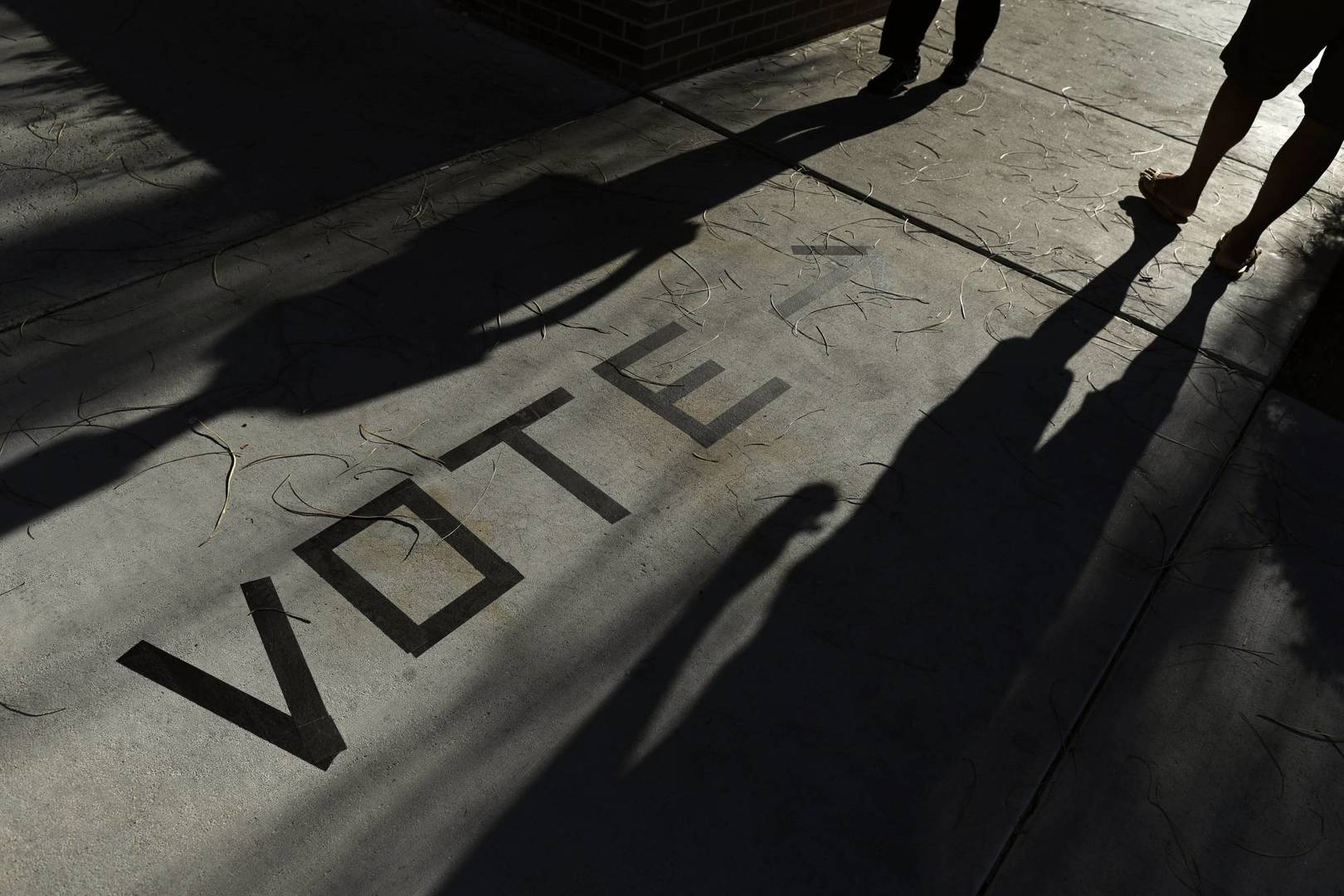
How a small federal commission tries to spur innovation in elections
Elections are operated by local officials. So methods vary all over the country. At the federal level, the U.S. Election Assistance Commission encourages innovation...
Elections are operated by local officials. So methods vary all over the country. At the federal level, the U.S. Election Assistance Commission encourages innovation each year with a program called the Clearinghouse Awards. Nominations are now open for 2022. With more on how the commission looks at elections, the Federal Drive with Tom Temin spoke with EAC Chairman Thomas Hicks.
Interview transcript:
Tom Temin
So you have a way for local election officials then to send in what they have done, in a given year. Tell us how this works and who evaluates what it is that they have put in.Thomas Hicks
So this, I think, is one of the great program that we operate. We allow election officials to nominate themselves for clearing, we call it the Cleary Awards. And it’s been around since 2016. And basically, what we allow for folks to do, is recognize best practices and elections and celebrate accomplishments of election officials, nationwide. We allow other election officials and the folks on our for boards to be the judges of that. So they have to volunteer to do that. So they’re being judged by their peers. It’s basically, something that say, hey, we’re doing great things, recognize us. And the great piece of that, is that other states and jurisdictions can emulate that as we move forward. So best practices, that as part of our Clearinghouse function, so that other states can see what other states are doing. And then emulate that as well.Tom Temin
And there are different categories for the awards in the clearies, the Clearing House awards. One of them is best practices and recruiting, retaining and training poll workers. And that’s kind of interesting, because everything devolves to them and their integrity. And we’ve seen videos of people, allegedly, doing this or that and all this kind of stuff that’s been around their last couple of national elections. Anyway, what are some best practices for getting people, in such a way that they’re engaged in the job and really understand what it is they have to do?Thomas Hicks
Well, I think of it as, it’s a way to serve and give back to the country. So for election officials to recognize other election officials for the recruitment of poll workers, retaining poll workers, because there’s a huge aspect of, if I serve once am I going to serve twice? And if I’m going to serve the third time. And then training those poll workers. So they realize that what they’re doing, they have to put their political beliefs at the door and serve in a nonpartisan way. Because everyone who’s eligible to vote, should be able to vote, independently and privately, without any sort of potterson piece of that when they go into the polling place.Tom Temin
And I guess to then, is part of the awards for innovation on, maybe, how the entrances to polling places can be organized and arranged. I’m just thinking of in my county, I had to run a gauntlet of people thrusting signs at me, everyone was complaining about this. They were, officially or technically, outside of the zone where there could be no politicking. But it felt like you were being rushed through competing, shouting parties. throwing banners at you before you got through that doorway frame.Thomas Hicks
Well, I’m sorry that you have to deal with that. But I think that’s a price that we pay for a democracy and expressing our First Amendment rights. But like you said, there is a barrier that’s placed in all jurisdictions, that you can’t campaign within. And also, I think that there are other aspects for folks, who might not want to go through that, to be able to either vote by mail or vote by absentee, should they not want to vote in person and go through that sort of aspect. We are actually having a hearing, to discuss a piece of what we got from this past appropriations bill of $1 million, to recruit poll workers for the college vote worker recruitment program. So we’re going to listen to innovations from around the country and other aspects from the election officials and private sector folks, on what they’ve done to recruit poll workers, whether or not that was before the pandemic, during the pandemic and after. To see what sort of things have changed, how they’ve changed moving forward and what can we do in the future.Tom Temin
But from the Cleary Awards given for the 2021 election cycle, anything stand out for you that the judges felt, wow, this is worthy of calling out?Thomas Hicks
I think that the one that really stands out to me, was the one down in Tallahassee, Florida, which was the conflict resolution traffic light. Which basically, when an issue came up, was that a green light of how you deal with it, or yellow light of how you deal with it, or red light of stop it, do not do that. And this is how you deal with that. And that’s actually Leon County, which is Tallahassee. I believe that’s the one that won, for that one. Other than that, I think of it as anything and everything that folks can put out there. And we added one other piece to that as well, to say that you might not win, but you might get an honorable mention. So if we get an honorable mention, then you can also, tout that as well. And as my fellow Commissioners and I go around the country, I think one of the best parts of the job, is to actually give these folks the award in person. And we’re able to put a few of those pictures in our annual report, when we’ve been able to do that.Tom Temin
We’re speaking with Thomas Hicks. He’s the chairman of the U.S. Election Assistance Commission. And I wanted to ask you about one more category. And that is improving accessibility for voters with disabilities. I would think that’s really something that’s come a long way, given some of the technology that’s available now, that most jurisdictions don’t rely solely on pencil and paper.Thomas Hicks
The fact is that election officials have come a long way, like you said, in terms of being able to help those who have disabilities, with elections overall. One of the greatest things that I remember seeing, is that they now are enacting legislation. Where it says that voters who have disabilities are able to do so, to be able to vote independently and privately. And so as we’ve moved forward, since our enacting legislation in 2002, this great thing has come along, called a smartphone. And so people can use their smartphones to get more information and so forth. You can’t still vote using your smartphone, but you can get a lot more information and you can get a lot more access to the polling place and so forth. But I think that as we move forward, there’s going to be more innovations, as technology changes, to allow for people to be able to vote independently and privately. Whether or not that’s using headphones and so forth, when they go into the polling place and other aspects as well.Tom Temin
And I would imagine that with the electronic voting machines, now that people are beginning to understand they can be secured and can be operated in a trustworthy manner, that there’s some way that, perhaps, haptic feedback or as you mouse over or pen over with audio feedback to headphones or something. These could be upgraded. Because they’re essentially computers, to help people that could use those different types of feedbacks, depending on what their disability is.Thomas Hicks
You’re 100% correct with that. And my fellow Commissioners and I voted in 2021, for a new standards for voting equipment, which makes them even more secure, makes them more accessible and moves the ball forward. And hopefully, companies will start building, to the next generation of voting equipment, to allow for folks who have disabilities to be able to vote, independently and privately, using additional equipment as well. And so I think that as we look forward to the 2022 Cleary Awards, that we’ll see some great innovations by local election officials, on how they were able to have folks voted independently and privately. And they will be recognized by their fellow election officials.Tom Temin
And by the way, when a local election board or commissioner gets a a clearing house award, is there any money with that? Or they just get their picture with EAC and, maybe, a plaque?Thomas Hicks
They’ll get a plaque, but they won’t get any money with it. So I think that they get good bragging rights and some other aspects as well. But there’s no money associated with it.Tom Temin
And what does the commission do to promulgate these best ideas, so that everyone can see them?Thomas Hicks
So we put them in our annual report, we talk about them when we go to different parts of the country. And our annual board meetings, which we have for the four boards that we have, these folks are recognized as well. So part of our clearinghouse function, is making sure that information is put out there. So the winners are on our website and a lot of those things as well. One of the best pieces that I remember seeing, is the I Voted stickers and how people like to see those stickers. And people actually get mad when they walk out of a polling place and don’t get their I Voted sticker, because they want to show, hey, I exercise my right to democracy. And this is me showing you as I go to work, or I go to school, or I go to the grocery store.Tom Temin
And would you say, as a final question, over the years and decades and especially as we get into this highly intensive technological century that we’re in. That the election methodologies might be narrowing from, say, a place like New York City, which pioneered election machines back in the 1930s I think. And the rural areas, which might still use paper and pencil exclusively. Is it all just, kind of, converging into one national standard, even though it is a locally administered activity.Thomas Hicks
Yes, and no. I think that as we move towards more national standards for federal elections, I think that the states still run the election. So they can still dictate how those elections are run. But they have to adhere to certain standards to make sure that folks can vote, independently and privately. And to ensure that they are able to cast their votes and have those votes counted accurately. So you might see, back in the 1930s, when New York was innovative with those lever machines, that those are no longer the gold standard. But as we move forward, with the new voting system guidelines, which jurisdiction will be the new gold standard. As we move forward through the 21st century.
Copyright © 2024 Federal News Network. All rights reserved. This website is not intended for users located within the European Economic Area.
Tom Temin is host of the Federal Drive and has been providing insight on federal technology and management issues for more than 30 years.
Follow @tteminWFED




